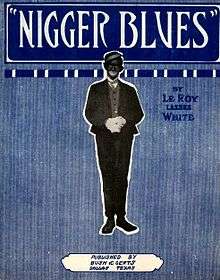Nigger Blues
"Nigger Blues", written by Le Roy "Lasses" White (1888 – 1949), was one of the first blues songs published.[1] Copyrighted by the Texas-born White in 1912,[2] it was first titled "Negro Blues", but for some reason when White published it in 1913, he retitled it.[3]
| "Nigger Blues" | |
|---|---|
 Sheet music cover, 1913 | |
| Song | |
| Written | 1912 |
| Published | 1913 |
| Genre | Blues |
| Songwriter(s) | Le Roy "Lasses" White |
In addition to the importance of the "Nigger Blues" for being one of the first published blues songs and written by one of the first composers of twelve-bar blues,[4] it was the first whose lyrics were in what would become the standard blues form used by the 1920s vaudeville performers and found in the folk blues songs collected and recorded in the 1930s.[5] e.g.:
Oh! the blues aint nothing, Oh! the blues aint nothing
Oh! the blues aint nothing, But a good man feeling bad
Oh! the blues aint nothing, But a good man feeling bad
Oh! that's a feeling That I've often had[6]
and:
Oh! yonder comes, Oh! yonder comes
Oh! yonder comes the train coming down the track
Oh! yonder comes the train coming down the track
To take me away, But it aint going to bring me back[7]
Early recordings
| Date | Artist | Label |
|---|---|---|
| July 1916 | George O'Connor | Columbia A-2064[8] |
| August 1916 | Prince's Band | Columbia A-2064[9] |
| October 1916 | Victor Military Band | Victor 18174 |
| 1919 | Al Bernard | Edison Blue Amberol 3766[10] |
References
- Gracyk, Popular American Recording Pioneers, p. 43: "It was followed in July 1919 by two Blue Amberol selections. Blue Amberol 3766 features a 1913 Leroy "Lasses" White composition called "Nigger Blues" (Bernard later recorded with minstrel entertainer Lasses White for Columbia). Notwithstanding its offensive title, "Nigger Blues" is important for being one of the first songs labeled "blues" to be published. George O'Connor had recorded it in 1916 for Columbia."
- Robert Palmer. Deep Blues. Penguin Books. p. 105. ISBN 978-0-14-006223-6.
- Monge, "New Songs of Blind Lemon Jefferson", p. 19: "In fact, in addition to its textual relationship in the first stanza to 'Michigan Water Blues,' Jefferson’s 'Light House Blues' is related textually and musically to an even older song, 'The Negro Blues'/'Nigger Blues' by Leroy 'Lasses' White of Dallas. White registered his tune with a set of fifteen three-line stanzas for copyright on November 9, 1912, under the former title. In 1913, a shortened version of the piece was published under the latter infelicitous title, containing only six stanzas, five of which are close variants of stanzas in the longer version and one of which is new."
- Oliver, The New Grove gospel, Blues and Jazz, p. 49: "Handy's The Memphis Blues was published in 1915 [sic], but Leroy 'Lasses' White, a blackface entertainer, who composed Nigger Blues, 1912 (published 1913) was one of the first to write in the 12-bar form;
- Carlin, Country Music, p. 224: "After performing in other companies, White returned to Dallas, where he published "Nigger Blues," a stringing together of standard blues verses. (It opens with the oft-repeated, "The blues aint nothin' ... but a good man feelin' bad.")"
- White, "Nigger Blues".
- White, "Nigger Blues".
- Rust, The Columbia Master Book Discography, p. 184.
- Rust, The Columbia Master Book Discography, p. 138.
- Cylinder Preservation and Digitization Project, "Nigger Blues."
Bibliography
- Cylinder Preservation and Digitization Project. "Nigger Blues". University of California, Santa Barbara.
- Carlin, Richard. Country Music: A Biographical Dictionary. New York: Routledge (2002)
- Gracyk, Tim. Popular American Recording Pioneers: 1895-1925. New York: Routledge (2000).
- Monge, Luigi; David Evans. "New Songs of Blind Lemon Jefferson". Journal of Texas Music History 3:2 (Fall 2003).
- Oliver, Paul; Harrison, Max; Bolcom, William. The New Grove Gospel, Blues and Jazz: With Spirituals and Ragtime. New York: W. W. Norton & Company (1997).
- Rust, Brian. The Columbia Master Book Discography. Westport, CT: Greenwood Press (1999)
- White, Le Roy "Lasses". "Nigger Blues" (sheet music). Dallas, TX: Bush & Gerts (1913).
External links
- "Nigger Blues"; E. Azalia Hackley Collection, Detroit Public Library.